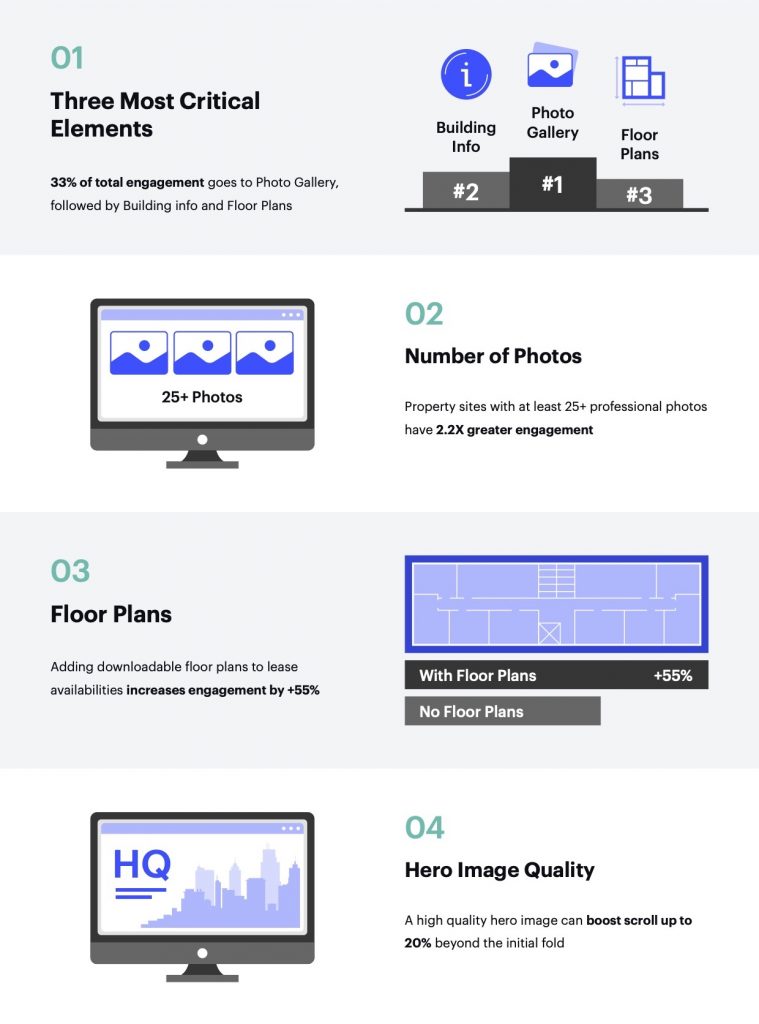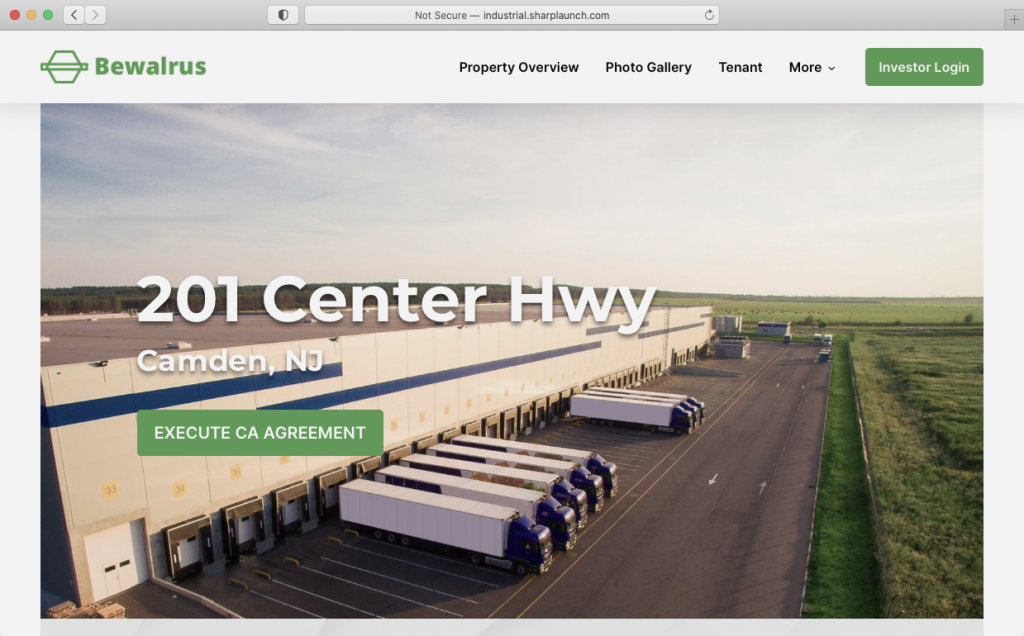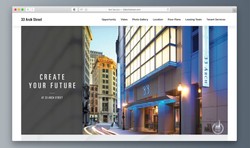
Marketing Best Practices
Why You Need a Property Website for Every Listing
Whether you’re a property owner or broker, having an established, professional online presence to engage with prospects and successfully conduct business is no longer an option. It’s a necessity if you want to remain relevant and navigate the difficulties presented in today’s environment.
Studies say that more than 85% of users begin their property searches online. Plus, once they find your site, 75% of people say they judge a company’s credibility based on the design of its website.
That means that in order to effectively market assets and stand out from the competition, it’s vital to establish a marketing foundation that extends beyond mere flyers, brochures, and LoopNet listings.
To effectively market assets and stand out from the competition, it’s vital to establish a marketing foundation that extends beyond mere flyers, brochures, and LoopNet listings.
A professional property website gives you the foundation you need to expand your digital footprint and engage both potential and existing tenants.
Let’s have a look at the 6 reasons why you need a website not only for your CRE firm, but also for every property listing.
1. Make a Powerful First Impression
In the fast-moving CRE industry, your prospects expect your property to have a high-quality, authoritative web presence.
A well-designed, interactive property website in line with your corporate branding is essential to establishing trust and credibility while maintaining consistency across your portfolio, thus making a great first impression among valued prospects.
33 Arch Street by CBRE New England
A full-feature commercial real estate marketing software can help automate and scale the creation of listing websites and keep the information online up-to-date by feeding data to other listing portals and social media channels.
2. Keep Property Information Up to Date
Among the most frustrating challenges for prospects scouring the web for available listings is the headache of sifting through old, outdated property information on commercial real estate listing sites and social media channels.
It is possible they do not reflect the property as it currently stands nor provide accurate, up-to-date contact information for the brokers and property managers overseeing the asset.
Having a dedicated commercial real estate landing page for your listing allows you to always maintain up-to-date property information and complete control over what is published online. Your building information, availabilities, price and contact information can be updated in minutes.
You are also making sure your prospects are focused on your listing alone and not distracted by other listings typically presented on CRE listing sites.
As a property owner or property manager you can create an property management website to help your existing tenants access building information, tenant manuals, rules and regulations or emergency procedures.
3. Feature the Most Critical Elements That Buyers Want
Your website is the ultimate showroom to display all relevant creative assets you’ve created for your properties and you can put your valuable content to good use, showing investors and potential tenants everything they need from anywhere in the world—and from the comfort of their desk or mobile phone.
By creating a dedicated property website for each listing you can accentuate key property features you wish to highlight to a prospective buyer or tenant.
According to our recent analysis we saw that the majority of visitors scroll directly to the photo gallery, building information and floor plans sections.

Brokerages and owners can focus on a few key elements that will capture the attention of interested tenants and present their properties in the best light by doing the following:
- Play up your assets’ most valuable amenities and highlight the key characteristics of each opportunity with your images and descriptions.
- Provide 3D virtual tours to give prospects an immersive digital experience of the property to generate interest before having to schedule an onsite tour.
- Supply updated information on current availabilities and include detailed floor plans that are easy to download.
- Display awards and certifications that provide instant recognition for your building, enhances your brand, and differentiates your property.
- Highlight surrounding amenities and other points of interests such as local businesses and corporate neighbors.
- Add contact information for property management and service teams.
4. Provide Direct Access to Key Documents
Your property website never sleeps. In the current climate, it’s important to be accessible anytime day or night, 24/7 and with a platform that can provide access to key marketing and sales documents to make sure you’re capturing interest and not losing opportunities.

By including an area on your property website where prospects can sign up to access documents you’re not only providing a streamlined communication and document sharing process, but also enabling a quick way to identify and qualify leads.
Imagine saving hours of time spent on sending PDF attachments back and forth and instead sharing one unique URL where all this information lives and track exactly who accessed it and at what time.
5. Track The Most Important KPIs
Do you have insights into your website analytics? Do you know where your visitors come from? If you don’t have relevant data to measure your listing presentation’s performance, you can’t learn what works and what doesn’t.
Traditional methods to attract tenants and investors can be difficult to measure and determine the ROI. Printed flyers? Direct mail? A conversation over a networking lunch? Signage? Local sponsorships? It’s difficult to measure the effectiveness of the typical methods to get the word out, but your property website is different.
A property website, outfitted with analytics software, can track your traffic and visitor engagement and tell you which websites and campaigns drive the most traffic to your website without you having to lift a finger.
With more advanced tools, you can do some pretty amazing things, like learn what people are most likely to click or how much time they spend on specific areas of your website. This data becomes actionable, and helps you make future marketing investments based on what works.
6. Promote Across Multiple Channels
Expanding your digital footprint can help you reach a much larger number of potential investors or tenants than with traditional tactics. So, defining an effective commercial real estate marketing strategy to promote your listings depends largely on having the foundation that all your efforts will link to.
Your property website can be connected to traditional property portals like LoopNet and CoStar to make sure all the information and contact people are up-to-date.
In addition, in can serve as a centralized digital hub for your marketing and advertising campaigns on:
- Social media networks (LinkedIn, Twitter, Facebook)
- Email marketing campaigns
- Google Ad campaigns
- PR and news coverage
- Press releases or announcements
Related Blog Posts
Marketing Best Practices
Marketing Toolkit for Real Estate Investment Sales
As an investment sales team in commercial real estate, having the right tools at your...
Company updates
Avison Young Selects SharpLaunch as Exclusive CRE Marketing Solution Across U.S. and Canada
SharpLaunch delivers a unified global marketing experience and seamless integration,...
CRE Technology
How to Integrate SharpLaunch with Salesforce
While Salesforce is a powerful CRM, it’s not specifically designed for the unique needs...



